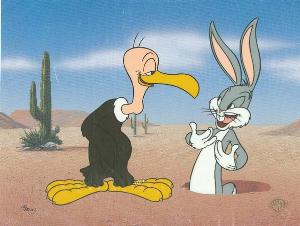Related Research Articles

Looney Tunes is an American media franchise produced and distributed by Warner Bros. The franchise began as a series of animated short films that originally ran from 1930 to 1969, alongside the related series Merrie Melodies, during the golden age of American animation. Following a revival in the late 1970s, new shorts were released as recently as 2014. The two series introduced a large cast of characters, including Bugs Bunny, Daffy Duck, and Porky Pig. The term Looney Tunes has since been expanded to also refer to the characters themselves.
This is a listing of the shorts, feature films, television programs, and television specials in the Looney Tunes and Merrie Melodies cartoon series, extending from 1929 through the present day. Altogether, 1,002 animated shorts alone were released under the Looney Tunes and Merrie Melodies banners from the 1930s through the 1960s. From the beginning to the present day, 1,041 theatrical shorts have been created.
Charlie Dog is an animated cartoon character in the Warner Brothers Looney Tunes series of cartoons. The character was featured in nine cartoons between 1941 and 1958. He is generally characterized as a friendly wise guy.

Merrie Melodies is an American animated comedy short film series distributed by Warner Bros. Pictures. It was part of the Looney Tunes franchise and featured many of the same characters. It originally ran from August 2, 1931, to September 20, 1969, during the golden age of American animation, though it was revived in 1979, with new shorts sporadically released until June 13, 1997. Originally, Merrie Melodies placed emphasis on one-shot color films in comparison to the black-and-white Looney Tunes films. After Bugs Bunny became the breakout character of Merrie Melodies and Looney Tunes transitioned to color production in the early 1940s, the two series gradually lost their distinctions and shorts were assigned to each series randomly.

Goopy Geer is an animated cartoon character created in 1932 for the Merrie Melodies series of cartoons from Warner Bros. He is a singing, dancing, piano-playing dog who is considered to be "the first Merrie Melodies star", although he only starred in three cartoons.

Bugs Bunny Gets the Boid is a 1942 Merrie Melodies cartoon, directed by Bob Clampett, produced by Leon Schlesinger, and released to theatres by Warner Bros. Pictures. It marks the first appearance of Beaky Buzzard in a Warner Bros. short.

I Love to Singa is a 1936 Warner Bros. Merrie Melodies animated cartoon directed by Tex Avery. The short was released on July 18, 1936.

A Corny Concerto is a 1943 Warner Bros. Merrie Melodies directed by Bob Clampett. The short was released on September 25, 1943, and stars Bugs Bunny, Porky Pig, Elmer Fudd and Daffy Duck.
Egghead Jr. is a character in the animated cartoon Looney Tunes, created by Robert McKimson in the 1950s. He debuted in 1954's Little Boy Boo, and made two subsequent Looney Tunes appearances in 1955's Feather Dusted and 1960s Crockett-Doodle-Doo.

Beaky Buzzard is an animated cartoon character in the Warner Bros. Looney Tunes and Merrie Melodies series of cartoons.
Berneice Edna Hansell, known as Bernice Hansen, was an American voice actress. She was best known for providing the voices for both female and young male characters in the mid to late 1930s for various cartoon studios, most notably Warner Bros. Cartoons, where she played Little Kitty in I Haven't Got a Hat (1935).
The Lion's Busy is a 1950 Warner Bros. Looney Tunes cartoon written by Tedd Pierce and directed by Friz Freleng. It features Leo the Lion and Beaky Buzzard, both voiced by Mel Blanc.
This is a listing of all the animated shorts released by Warner Bros. under the Looney Tunes and Merrie Melodies banners between 1940 and 1949.
This is a listing of all the animated shorts released by Warner Bros. under the Looney Tunes and Merrie Melodies banners between 1960 and 1969. A total of 147 shorts were released during the 1960s.

Backwoods Bunny is a 1959 Warner Bros. Merrie Melodies cartoon, directed by Robert McKimson and written by Tedd Pierce. The short was released on June 13, 1959, and stars Bugs Bunny.
The Little Lion Hunter is a Warner Bros. Merrie Melodies cartoon released to theaters on October 7, 1939. This short was the first of a series of five films featuring the Inki and mynah bird characters.
I Wanna Play House is a 1936 Warner Bros. Merrie Melodies cartoon directed by Friz Freleng. The short was released on January 11, 1936.

Looney Tunes Cartoons is an American animated television series developed by Pete Browngardt and produced by Warner Bros. Animation, based on the characters from Looney Tunes and Merrie Melodies. The series made its worldwide debut at the Annecy International Animation Film Festival on June 10, 2019, and premiered on HBO Max on May 27, 2020.
References
- ↑ Beck, Jerry; Friedwald, Will (1989). Looney Tunes and Merrie Melodies: A Complete Illustrated Guide to the Warner Bros. Cartoons. Henry Holt and Co. p. 209. ISBN 0-8050-0894-2.
- ↑ Lenburg, Jeff (1999). The Encyclopedia of Animated Cartoons. Checkmark Books. p. 54. ISBN 0-8160-3831-7 . Retrieved 6 June 2020.